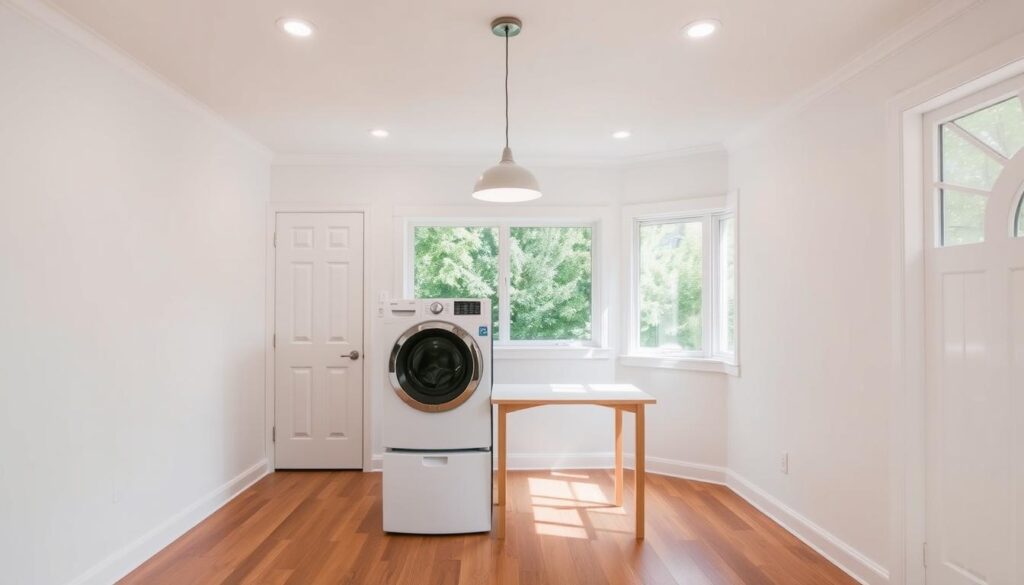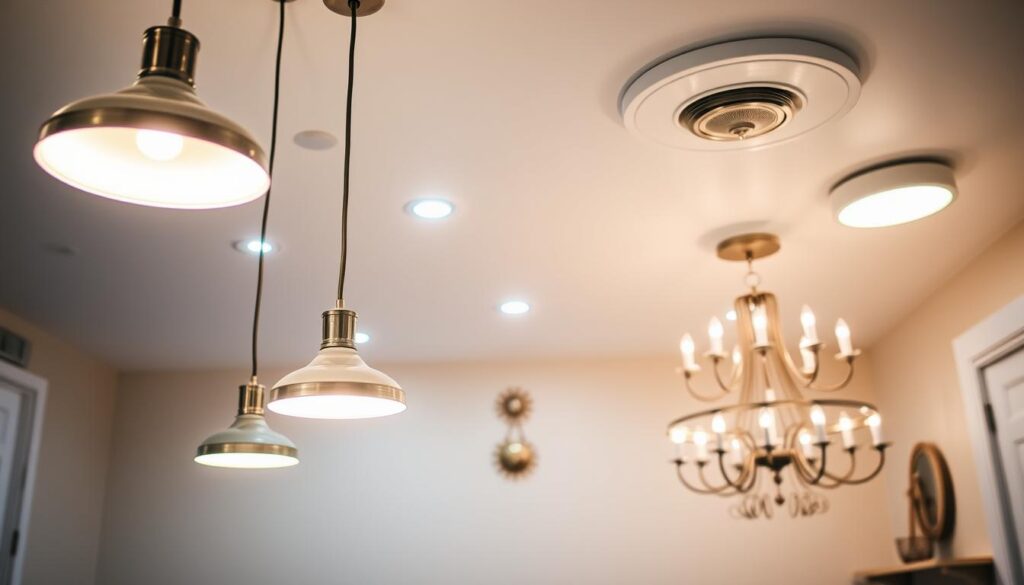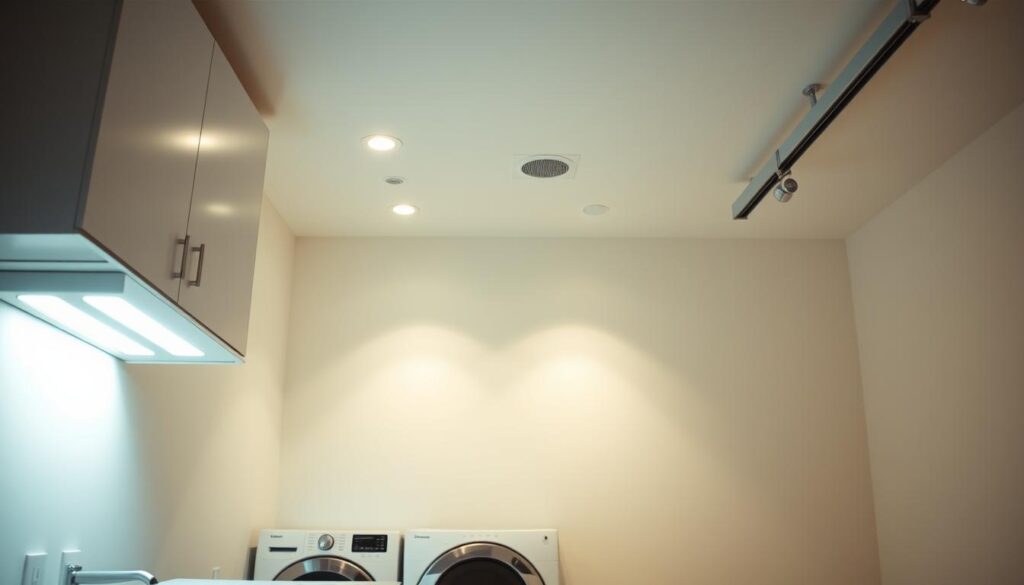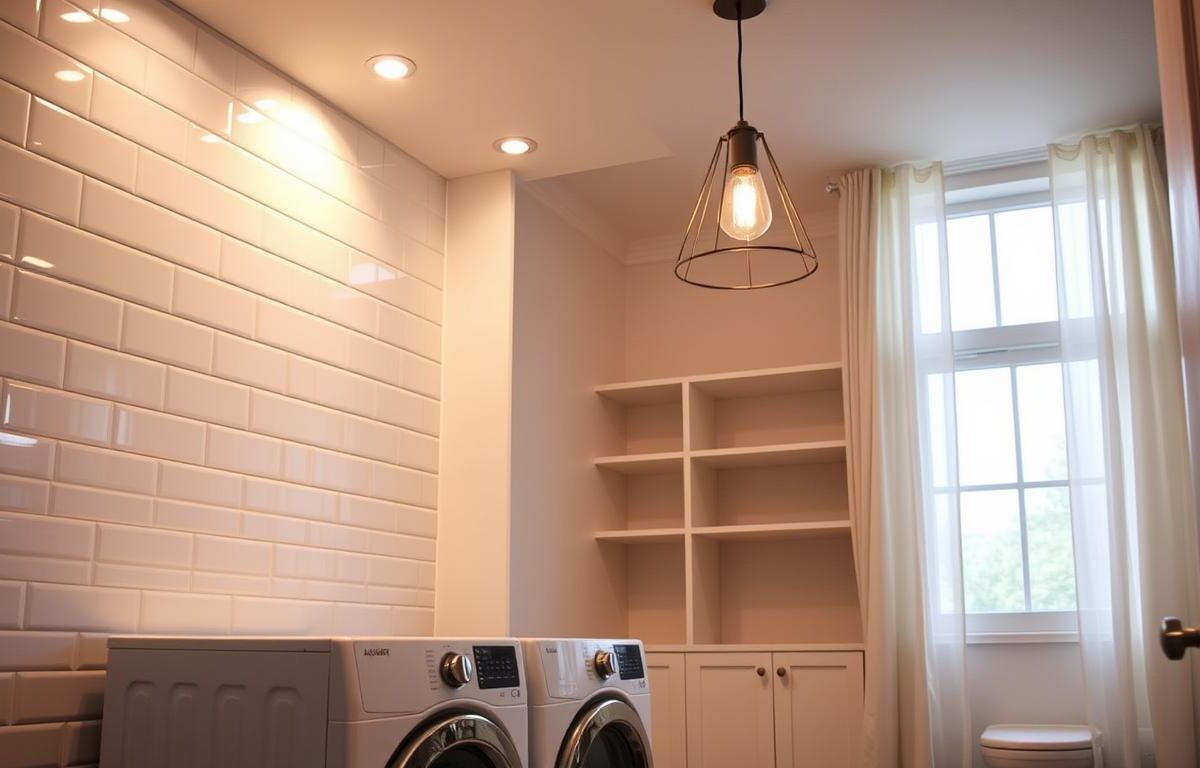Welcome to your go-to guide for creating a brighter, more efficient space for household chores. Whether you’re folding clothes or tackling stubborn stains, the right lighting can turn a dim, cluttered area into a functional zone that saves time and reduces frustration.
Good visibility matters when handling detailed tasks. Imagine easily spotting hidden lint or perfectly matching socks under crisp, even light. A well-designed setup combines overhead fixtures with targeted sources to eliminate shadows and eye strain. It’s not just about utility—thoughtful design can make chores feel less tedious.
This guide walks you through practical upgrades for any budget. Discover energy-efficient LED options, smart placement strategies, and fixtures that maximize your home’s potential. You’ll learn how layered illumination works and why adjustable brightness matters for different tasks.
Key Takeaways
- Proper illumination enhances efficiency for sorting, folding, and stain removal.
- Mix overhead and task lighting to eliminate shadows.
- Energy-efficient options reduce costs without sacrificing brightness.
- Adjustable fixtures adapt to various chore requirements.
- Even small upgrades can transform cramped spaces into organized zones.
Understanding the Role of Lighting in Your Laundry Room
Proper illumination is the secret weapon for hassle-free laundry days. Without it, sorting darks from lights or spotting a coffee stain becomes a guessing game. Strategic brightness lets you catch hidden lint, read care labels effortlessly, and pair socks accurately—no more mismatches!
Dim corners and flickering bulbs create everyday frustrations. Homeowners often struggle to distinguish navy from black shirts or miss smudges on collars. These oversights lead to rewashing cycles, wasted detergent, and frayed nerves.
Bright environments also boost morale. A well-lit zone feels less like a chore dungeon and more like an organized workspace. You’ll fold clothes faster and tackle stains confidently when shadows aren’t hiding your progress.
Smart placement solves common pain points. Overhead fixtures paired with targeted beams erase dark spots near appliances or folding counters. This combo ensures even coverage, so you won’t squint while pre-treating grass stains or measuring detergent.
| Lighting Challenge | Common Mistake | Solution |
|---|---|---|
| Poor color accuracy | Mixing whites with pastels | High-CRI bulbs |
| Shadowy work surfaces | Missed stains | Under-cabinet strips |
| Glare on screens | Squinting at settings | Diffused overhead panels |
Safety matters too. Clear visibility prevents spills when handling bleach or navigating around bulky machines. It’s not just about efficiency—thoughtful design protects your time, clothes, and peace of mind.
Assessing Your Laundry Room’s Lighting Needs
Ever wonder why some chores feel smoother than others? It often comes down to how well your workspace supports you. Start by asking: When do I usually do laundry? Morning sunlight might flood the area, but evening sessions could leave you straining to see stains. Track your habits for a week—you might spot patterns you’ve never noticed.

Evaluating Space and Task Requirements
Grab a notebook and sketch your layout. Mark where you sort colors, treat spills, or fold shirts. Dark corners near appliances? That’s where shadows sabotage your progress. Use a free smartphone app to measure brightness levels—aim for at least 300 lux on countertops.
Room shape plays a bigger role than you’d think. Galley-style setups often need wall-mounted fixtures to avoid casting shadows down the narrow aisle. In square rooms, position overhead fixtures slightly toward task zones rather than dead center.
Considering Natural vs. Artificial Light
South-facing windows pour in daylight but create glare on appliance screens. Sheer curtains soften harsh noon rays while preserving visibility. If your folding station sits under a skylight, rejoice—until winter clouds roll in. That’s when dimmable LEDs become your best ally.
Remember: Seasons change, but your whites still need washing. Install adjustable light sources that compensate for shorter days. Pair them with motion sensors near storage cabinets—no more fumbling for detergent in the dark.
Exploring Different Types of Lighting Fixtures
Layered illumination transforms cluttered spaces into efficient work zones. Three core fixtures work together: ambient, task, and accent systems. Each serves distinct purposes while creating a cohesive glow that adapts to sorting, folding, and detailed stain treatments.

Overhead, Task, and Accent Options
Ambient lighting acts as your base layer. Think flush-mounted ceiling panels or recessed fixtures that wash the entire area in even brightness. This eliminates dark corners when moving between appliances.
Task-focused options target specific workstations. Install slim LED strips under shelves to illuminate detergent measurements or pendant lights above folding counters. These provide shadow-free visibility for reading care tags.
Accent pieces add personality. Directional wall sconces highlight decorative backsplashes or artwork. They soften harsh overhead glare while making the space feel inviting—no more dungeon vibes during midnight wash cycles.
| Type | Purpose | Ideal Placement | Example |
|---|---|---|---|
| Ambient | General visibility | Ceiling center | LED flush mounts |
| Task | Detailed work | Above appliances | Under-cabinet strips |
| Accent | Aesthetic enhancement | Near decor elements | Adjustable sconces |
Combining these options prevents uneven brightness. You’ll spot lint on black jeans effortlessly and pair socks faster. Remember: layered lighting isn’t just practical—it turns daily chores into smoother routines.
Overhead Lighting: Bright and Functional Solutions
Every efficient workspace starts with a solid foundation. Overhead systems act as the backbone of your illumination plan, bathing the entire area in reliable brightness. These fixtures ensure you can move safely between appliances and spot stray socks hiding in corners.
Benefits of LED Ceiling Lights
LED ceiling lights outshine traditional bulbs in nearly every way. They use 75% less energy than incandescent options while lasting up to 25 times longer. Instant full brightness means no waiting for tubes to flicker awake—perfect for quick stain checks.
These modern marvels stay cool to the touch, reducing fire risks near lint-prone zones. You’ll save roughly $6 annually per fixture on energy bills, according to Energy Star estimates. That adds up fast in homes with multiple ceiling lights.
Flush Mount vs. Recessed Fixtures
Flush-mounted designs hug the ceiling, making them ideal for spaces under 8 feet tall. Their streamlined profile won’t snag laundry baskets during quick turns. Choose models with frosted glass for glare-free sorting.
Recessed options nestle into the ceiling, creating a sleek look for higher spaces. They direct light precisely where needed—like over folding tables—without overwhelming the area. Both styles pair perfectly with dimmer switches for adjustable ambiance.
Calculate your ideal brightness by multiplying square footage by 20 lumens. A 10×10 zone needs 2,000 lumens total. Split this between multiple led ceiling fixtures for balanced coverage that banishes shadows.
Task Lighting: Enhancing Your Work Areas
Precision matters when tackling detailed chores. While overhead fixtures set the stage, targeted beams turn tricky tasks into smooth operations. Imagine inspecting a shirt collar under crisp light that reveals every fiber—no shadows, no guesswork.

Under-Cabinet and Countertop Lighting Options
Stick-on LED strips transform dark nooks above appliances. Mount them under shelves to illuminate detergent measurements or stain treatments. Puck lights offer flexible placement—space them 12-18 inches apart for even coverage on folding surfaces.
Pendant Lights for Focused Illumination
Suspend adjustable pendants 30-36 inches above washer lids. This creates a bright pool for sorting colors or checking pockets. Choose models with swivel arms to direct light precisely where hands are busy.
Dimmable systems adapt to shifting needs. Crank up brightness for thread matching, then soften it for routine folding. High-CRI bulbs (90+) reveal true fabric hues, preventing accidental dye transfers during sorting.
| Task Zone | Ideal Fixture | Brightness Tip |
|---|---|---|
| Ironing Board | Directional track light | 500 lumens |
| Control Panels | LED tape lights | 4000K color temp |
| Sorting Baskets | Adjustable pendant | 60W equivalent |
Proper placement reduces neck strain. Angle under-cabinet fixtures toward work surfaces at 45 degrees. This banishes shadows while keeping glare off shiny appliance finishes.
Maximizing Natural Light for a Brighter Laundry Room
Sunlight offers more than just energy savings—it lifts moods and sharpens focus during daily tasks. Strategic use of daylight cuts electricity bills while creating an airy, productive environment. Let’s explore how to harness this free resource effectively.
Windows and Skylights: Your Daylight Allies
Sheer curtains or frosted window films soften harsh rays while maintaining privacy. They diffuse sunlight into a gentle glow, perfect for reading care tags without glare on appliance screens. Position folding stations within 3 feet of windows to catch the brightest beams.
Basements gain new life with tubular skylights. These compact fixtures channel sunlight through reflective tubes, illuminating interior spaces without structural changes. Pair them with adjustable LED panels for cloudy days or evening chores.
| Natural Light Challenge | Quick Fix | Long-Term Solution |
|---|---|---|
| Fabric fading | UV-filtering window film | North-facing windows |
| Seasonal glare | Retractable shades | Overhang installations |
| Winter darkness | Mirrored backsplashes | Hybrid solar/LED fixtures |
Morning light boosts alertness—schedule sorting tasks then. Afternoon sun warms south-facing zones, ideal for air-drying delicates. Smart bulbs with daylight sensors automatically adjust artificial brightness as natural levels change.
Remember: Balance is key. Blend sunlight with dimmable LEDs for seamless transitions. Your space stays functional whether it’s high noon or a rainy twilight.
Incorporating Accent Lighting for Style and Depth
Who says utility spaces can’t dazzle? Accent lighting adds that final touch where function meets flair. It turns basic zones into curated areas that spark joy during daily tasks.
Decorative Wall Sconces and Pendants
Strategically placed wall sconces create soft pools of light, drawing eyes to open shelving or textured backsplashes. A single pendant above folding stations introduces warmth while maintaining task-ready brightness. These fixtures work like jewelry for your space—subtle but transformative.
Match your style effortlessly. Farmhouse enthusiasts might choose wrought-iron sconces with Edison bulbs, while modern spaces shine with geometric designs. The goal? Enhance—not overwhelm—your existing decor.
Balance is key. Use dimmable options to maintain practical visibility while adding character. Suddenly, sorting socks feels less like a chore and more like time spent in a thoughtfully designed oasis.

